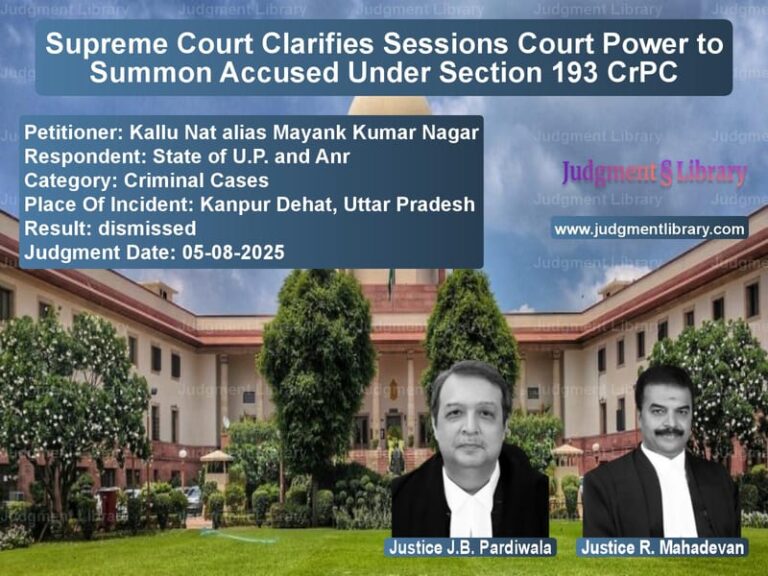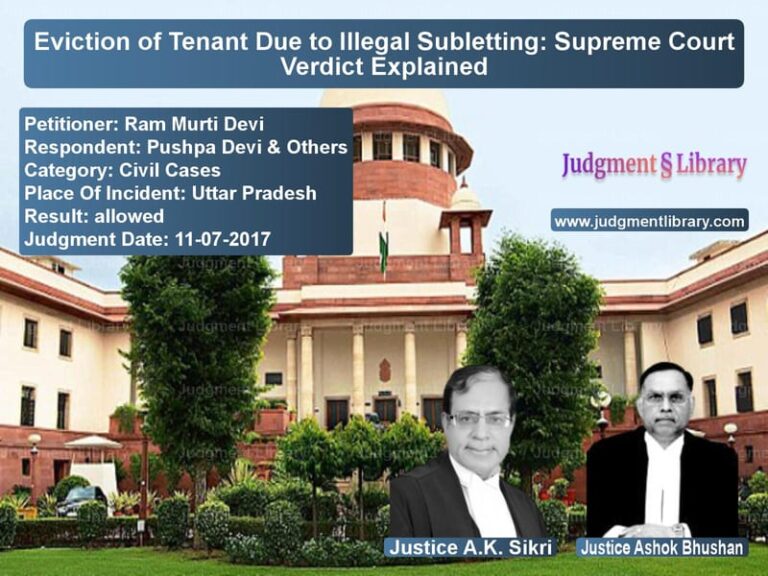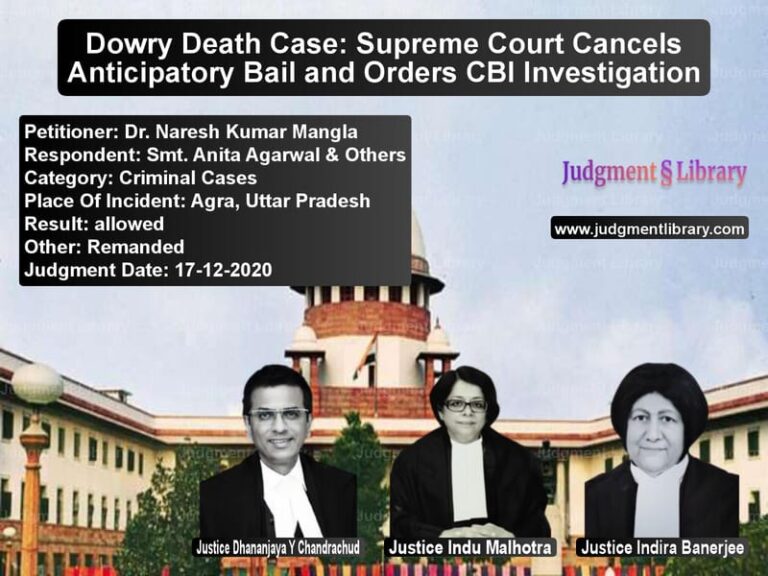Imposition of Fixed-Term Sentence in Heinous Patricide: The Case of State of Haryana vs Anand Kindo & Anr.
The case of State of Haryana vs Anand Kindo & Anr. deals with the brutal murder of an elderly couple, committed by their trusted employees in a premeditated manner. The crime is marked by the gruesome manner in which the victims were killed, and the trial and appellate proceedings examined the extent of punishment to be awarded to the accused, with the issue of sentencing at the forefront of the dispute.
Background of the Case
The victims, Major General Kailash Chand Dhingra and his wife Smt. Sangeeta Dhingra, were murdered by the accused, who were employed as domestic helpers in the Dhingra household. The crime was committed when the elderly couple was sleeping, with no chance to defend themselves. The accused used a hammer and a Tava to batter the victims’ faces beyond recognition, making it difficult to identify them initially. The brutal act was motivated purely by greed for money, as the accused planned and executed the murder to rob the couple.
The crime was shocking not only because of the brutality involved but also because the victims had placed their trust in their employees, who had worked for them without any prior issues. The accused’s betrayal of this trust was a key factor in determining the nature of the offense and the appropriate punishment. The trial court initially sentenced the accused to death, but the High Court later commuted the sentence to life imprisonment.
Read also: https://judgmentlibrary.com/supreme-court-acquits-two-trade-union-leaders-in-assam-murder-case/
The Trial and Conviction
Following the brutal murders, the case was taken up by the trial court, where the accused were convicted under Section 302 (murder) of the Indian Penal Code (IPC). The prosecution established that the murder was not a result of a sudden quarrel but was premeditated and committed in cold blood. The trial court noted the brutal nature of the crime, the absence of any provocation, and the fact that the victims were elderly, making the crime even more heinous.
The trial court, in its judgment, decided that the case warranted the death penalty. However, when the case was appealed to the High Court, the Court found that while the crime was undeniably brutal, it did not qualify as one of the “rarest of rare” cases that warranted a death sentence. As a result, the High Court reduced the sentence to life imprisonment, while upholding the conviction.
Appeals and the Issue of Sentencing
The appeals before the Supreme Court were filed by both the State and the complainant, challenging the reduction of the sentence to life imprisonment. The State and the complainant argued that the brutal and premeditated nature of the crime demanded a harsher penalty. The State contended that the crime was committed by individuals who had been entrusted with the care of the victims, making their betrayal of that trust even more egregious.
The petitioners argued that the High Court had erred in reducing the sentence and that the death penalty was appropriate in this case due to the horrific manner in which the crime was committed. The State also highlighted that the convicted individuals had attempted to escape from prison after their conviction, which further illustrated their disregard for the law and the gravity of their actions.
Read also: https://judgmentlibrary.com/supreme-court-modifies-sentence-in-maharashtra-assault-case/
The Defense Argument
On the other hand, the defense argued that the convicted individuals were relatively young at the time of the crime (aged 22 and 24) and had already served 15 years in prison. Their counsel emphasized the possibility of rehabilitation, citing their young age and the potential for them to reintegrate into society after serving their sentence. The defense also argued that the death penalty was not appropriate, as the crime did not meet the threshold for the “rarest of rare” category.
The defense also pointed out that while the crime was heinous, the accused were motivated by greed rather than any personal animosity or hatred toward the victims. They requested that the sentence be reduced to life imprisonment without the possibility of remission.
The Court’s Analysis
The Supreme Court, after hearing the arguments, took into account several key factors in determining the appropriate sentence. First, the Court emphasized the brutality of the crime, particularly the use of blunt objects such as a hammer and Tava to inflict fatal injuries. The Court noted that the victims were elderly and had no opportunity to defend themselves, which made the crime particularly gruesome.
The Court also considered the motive behind the crime—greed for money. The accused had been trusted employees of the victims, and their betrayal of that trust was a significant factor in determining the severity of the offense. The Court acknowledged that the crime was not a sudden act of passion but a premeditated and carefully planned murder.
Read also: https://judgmentlibrary.com/anticipatory-bail-granted-in-rape-case-supreme-courts-detailed-analysis/
On the issue of sentencing, the Court examined the principles of justice and deterrence. The Court noted that while the crime was certainly heinous, it did not qualify as one of the “rarest of rare” cases, which would warrant the death penalty. The Court referred to previous cases and legal precedents, noting that the death penalty should only be imposed in exceptional cases where the crime is so egregious that it shocks the collective conscience of society.
Final Judgment
The Supreme Court, after considering the facts and legal arguments, ultimately decided to impose a fixed-term sentence of 30 years for the convicts. The Court held that while the death penalty was not warranted in this case, a long-term sentence was necessary to reflect the gravity of the offense and to ensure that the convicts would not be released prematurely. The Court emphasized that the convicts would be eligible for remission only after serving their sentence, which would allow them to demonstrate their rehabilitation before being reintegrated into society.
The Court’s decision struck a balance between justice for the victims and the possibility of rehabilitation for the convicts. The Court acknowledged the brutal nature of the crime but also took into account the age and potential for reform of the accused. The Court’s judgment reflects a nuanced approach to sentencing, where the interests of justice and the possibility of rehabilitation are carefully weighed.
Significance of the Judgment
This case is significant in that it illustrates the Supreme Court’s approach to sentencing in cases involving premeditated and brutal crimes. The Court reinforced the principle that while the severity of the crime is an important factor, the death penalty should be reserved for the rarest of rare cases. The Court also took into account the potential for rehabilitation, which is an important consideration in the context of life sentences.
The decision highlights the role of the judiciary in balancing the interests of justice, deterrence, and the rehabilitation of offenders. The judgment also reflects the evolving nature of criminal law, where the focus is not only on punishing the crime but also on ensuring that the punishment is proportionate to the offense and allows for the possibility of reform.
Petitioner Name: State of Haryana.Respondent Name: Anand Kindo & Anr..Judgment By: Justice Sanjay Kishan Kaul, Justice Abhay S. Oka, Justice Vikram Nath.Place Of Incident: Haryana, India.Judgment Date: 08-09-2022.
Don’t miss out on the full details! Download the complete judgment in PDF format below and gain valuable insights instantly!
Download Judgment: state-of-haryana-vs-anand-kindo-&-anr.-supreme-court-of-india-judgment-dated-08-09-2022.pdf
Directly Download Judgment: Directly download this Judgment
See all petitions in Murder Cases
See all petitions in Bail and Anticipatory Bail
See all petitions in Judgment by Sanjay Kishan Kaul
See all petitions in Judgment by Abhay S. Oka
See all petitions in Judgment by Vikram Nath
See all petitions in dismissed
See all petitions in supreme court of India judgments September 2022
See all petitions in 2022 judgments
See all posts in Criminal Cases Category
See all allowed petitions in Criminal Cases Category
See all Dismissed petitions in Criminal Cases Category
See all partially allowed petitions in Criminal Cases Category







